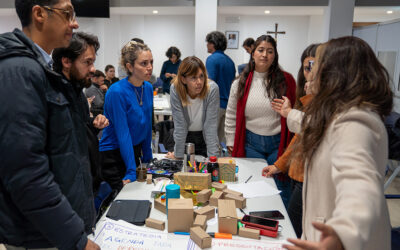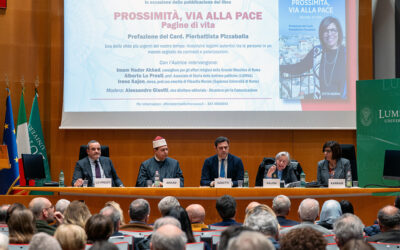 “I would share one particular incident. The guys were walking around the corridors. One of us noticed a new arrival. His eyes were weary and still. One of us went up to him and asked: ‘What is it?’ and the guy was speechless. He understood him perfectly: he had had the same experience. He said: ‘Go on, come to my cell and I’ll offer you a good cup of coffee!’ As he prepared the coffee, he continued: ‘Look! You’re doing okay here. Today the sun is shining, and you’ve made a friend. What more do you want from life?’ On visiting day they both happened to be in the same room. The wife and son of the new arrival stood up and went over to thank him for the goodness he had shown their relative.” This was recounted by P.B. a volunteer worker in Padua Prison, Italy. It testifies to the dignity expressed in several stories that are born from small everyday gestures. It was collected during a workshop, the first such workshop for prison workers in Italy, organized by the Focolare’s New Humanity Movement along with the international Comunione e Diritto (CeD)[Communion and Law] network. The workshop was held in Castel Gandolfo, Italy on November 9-10, 2013. Fifty people including prison volunteers, teachers, social workers, ex-inmates, court supervisors and retired ex-court-presidents attended the workshop. There was also an Anglican priest and his wife who along with several others were interested in the topic. These were the main protagonists of this first seminar, a very timely workshop given the current state of prisons in Italy, which was recently denounced by President of the Republic Giorgio Napolitano. There are currently 65, 831 inmates in prisons with places for 45,647 inmates. An excess of more than 20,000 people living in inhuman conditions due to the lack of space and basic hygiene: not to mention the violence and abuse. “We have tried to enter into their suffering and oftentimes the human helplessness in these situations,” says social worker Francesco Giubilato. “We focused on the essentials: the human person and relationship. We considered the individual and his suffering, his needs and also the expectations of the inmates, the prison guards, the prison workers, their families and the community. We sought to create authentic relationships that alleviate loneliness and suffering, as well as bring healing. This meant being attentive to needs and creative in finding solutions that were in line with rules and regulations.” The workshop highlighted different experiences that are underway in Italy in response to this situation. One such experience was that of G.D. who has spent a year in civil service with the La fraternita Association [the Brotherhood Association] inside the Montorso Prison in Verona, Italy. Now he serves the Association at the Listening Centre for families of inmates and ex-inmates. Alfonso Di Nicola works in Roman prisons. Their experiences have highlighted the critical issues related to the difficulty in relating among the people involved. It has likewise shown how internment, when there is the dimension of brotherhood can radically change people and their environment for the better. Gianni Caso, Honorary Adjunct Chairman Emeritus of the Supreme Court has opened another front which is that of the information sector. Here honest information is made available to citizens, which moves them to work for the promotion and changes of laws and their application within a framework of justice, equity and respect for human dignity.
“I would share one particular incident. The guys were walking around the corridors. One of us noticed a new arrival. His eyes were weary and still. One of us went up to him and asked: ‘What is it?’ and the guy was speechless. He understood him perfectly: he had had the same experience. He said: ‘Go on, come to my cell and I’ll offer you a good cup of coffee!’ As he prepared the coffee, he continued: ‘Look! You’re doing okay here. Today the sun is shining, and you’ve made a friend. What more do you want from life?’ On visiting day they both happened to be in the same room. The wife and son of the new arrival stood up and went over to thank him for the goodness he had shown their relative.” This was recounted by P.B. a volunteer worker in Padua Prison, Italy. It testifies to the dignity expressed in several stories that are born from small everyday gestures. It was collected during a workshop, the first such workshop for prison workers in Italy, organized by the Focolare’s New Humanity Movement along with the international Comunione e Diritto (CeD)[Communion and Law] network. The workshop was held in Castel Gandolfo, Italy on November 9-10, 2013. Fifty people including prison volunteers, teachers, social workers, ex-inmates, court supervisors and retired ex-court-presidents attended the workshop. There was also an Anglican priest and his wife who along with several others were interested in the topic. These were the main protagonists of this first seminar, a very timely workshop given the current state of prisons in Italy, which was recently denounced by President of the Republic Giorgio Napolitano. There are currently 65, 831 inmates in prisons with places for 45,647 inmates. An excess of more than 20,000 people living in inhuman conditions due to the lack of space and basic hygiene: not to mention the violence and abuse. “We have tried to enter into their suffering and oftentimes the human helplessness in these situations,” says social worker Francesco Giubilato. “We focused on the essentials: the human person and relationship. We considered the individual and his suffering, his needs and also the expectations of the inmates, the prison guards, the prison workers, their families and the community. We sought to create authentic relationships that alleviate loneliness and suffering, as well as bring healing. This meant being attentive to needs and creative in finding solutions that were in line with rules and regulations.” The workshop highlighted different experiences that are underway in Italy in response to this situation. One such experience was that of G.D. who has spent a year in civil service with the La fraternita Association [the Brotherhood Association] inside the Montorso Prison in Verona, Italy. Now he serves the Association at the Listening Centre for families of inmates and ex-inmates. Alfonso Di Nicola works in Roman prisons. Their experiences have highlighted the critical issues related to the difficulty in relating among the people involved. It has likewise shown how internment, when there is the dimension of brotherhood can radically change people and their environment for the better. Gianni Caso, Honorary Adjunct Chairman Emeritus of the Supreme Court has opened another front which is that of the information sector. Here honest information is made available to citizens, which moves them to work for the promotion and changes of laws and their application within a framework of justice, equity and respect for human dignity.
Give with joy
Give with joy




0 Comments